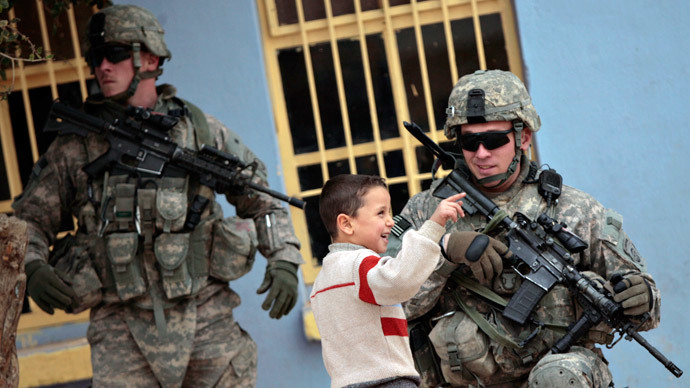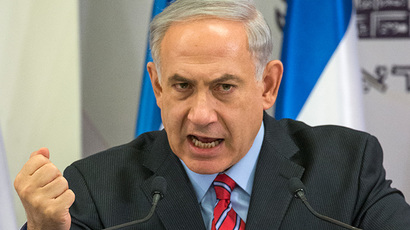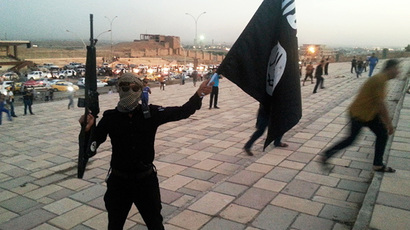White House announces an additional 300 troops to Iraq

Less than a week after announcing the deployment of additional US personnel to Iraq, the White House has said that up to 300 more troops are being sent to the country to bolster security at key facilities amid an organized push by ISIS militants.
In a letter to Congress on Monday, President Obama wrote that
additional troop deployments are “a prudent measure to
protect US citizens and property.”
“This force is deploying for the purpose of protecting U.S.
citizens and property, if necessary, and is equipped for
combat,” wrote the President.
The letter, the third in two weeks, outlined that the additional
force would include a detachment of helicopters as well as
unmanned aerial vehicles, or drones. The troops are meant to
reinforce security at US diplomatic facilities, as well as
Baghdad International Airport.
Taking into account Monday’s announcement by the administration,
recent US reinforcements into Iraq now stand at 875. On June 16,
the president authorized a 275 troop deployment to strengthen
embassy security in Baghdad.
The White House also authorized 300 troops to travel to Iraq in
an advisory role, to train and assist Iraqi forces against ISIS
following an embarrassing withdrawal from Mosul earlier in June.
The withdrawal brought into sharp focus the level of combat
readiness of Iraq’s armed forces.
On Monday, ISIS (the Islamic State of Iraq and the Levant, or
simply Islamic State) announced the creation of a caliphate, or an Islamic state
governed by Sharia law, throughout its controlled territory
within Iraq and Syria. The group proclaimed its leader, Abu Bakr
al-Baghdadi, as the caliph and demanded Muslims around the world
pledge their allegiance.
As ISIS has expanded its reach within Iraq, questions regarding
Baghdad’s security have been raised. Though State Department
spokesperson Jen Psaki said the US embassy in the city
“remains open and will continue to engage daily with Iraqis
and their elected leaders,” officials cited by the
Washington Post believed the additional troop deployments were
aimed at not only protecting the embassy, but also ensuring
escape routes in the event of an evacuation.
On Monday, ISIS forces continued fighting in Tikrit, a city which
lies 100 miles northwest of Baghdad. Additional clashes were
reported 35 miles south of Tikrit, in Samarra.
The additional personnel announced by the White House on Monday
began arriving one day earlier, on Sunday, according to Pentagon
press secretary Rear Admiral John Kirby.
“The presence of these additional forces will help enable the
Embassy to continue its critical diplomatic mission and work with
Iraq on challenges they are facing as they confront ISIL
(ISIS),” said Kirby.
Iraqi Prime Minister Maliki lashed out at the US for alleged
delays in the delivery of purchased F-16 fighter jets and Apache
helicopters. In the meantime, Iraq has begun receiving a number
of Russian fighter jets to mount a campaign against ISIS
movements in the region.
Highlighting the complexity of different interests in the region,
both Iran and Syria have also become active in combating ISIS
within Iraqi territory. Iran has reportedly sent military
equipment and is currently flying surveillance drones over
Baghdad, while there have been reports of air raids conducted
within Iraq by Syria’s air force.
Though ISIS has seen its territories in Iraq’s north expand, the
current belief is that Baghdad itself is not in danger of being
overrun. Still, US efforts to bolster the city’s security reveal
that the Pentagon is taking the threat seriously.
ISIS, now the Islamic State, has risen to become a formidable
alliance comprised of Sunni radicals in Iraq, alongside former
members of Saddam Hussein’s Baath Party.
“You could see it coming as the Baathists joined with them at
the upper levels,” a British officer with knowledge of the
Saddam regime told McClatchy DC news.
“These are the men who ran Saddam’s Iraq, and whatever you
think of those old bastards, there was one thing they were very
good at: controlling Iraq like nobody else ever did,” the
former officer said.
The Islamic group has also preyed on dissatisfaction among Iraq’s
Sunni minority, who feel they have been pushed aside by Maliki’s
government. Recent fighting has worried many who fear a return to
the country’s worst period of sectarian bloodshed in 2006 and
2007.














